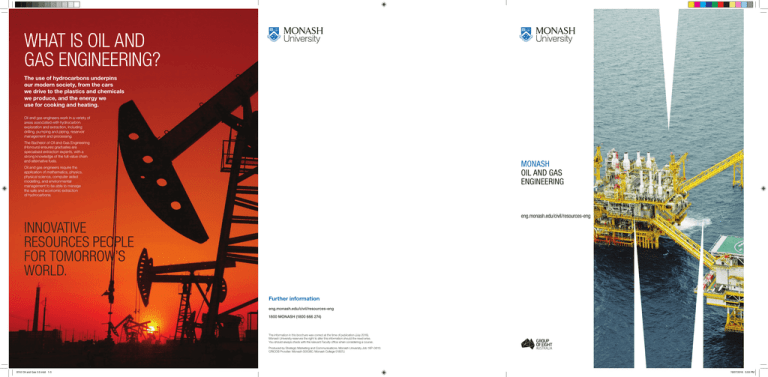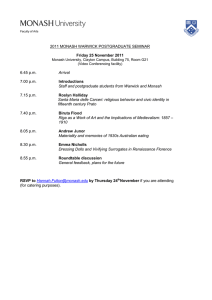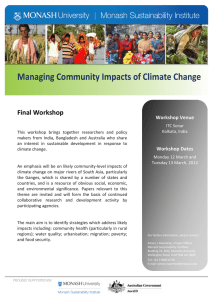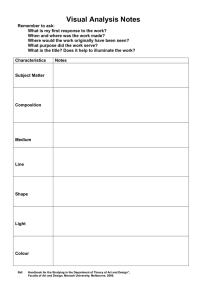what is oil and gas engineering? - Faculty of Engineering
advertisement

WHAT IS OIL AND GAS ENGINEERING? The use of hydrocarbons underpins our modern society, from the cars we drive to the plastics and chemicals we produce, and the energy we use for cooking and heating. Oil and gas engineers work in a variety of areas associated with hydrocarbon exploration and extraction, including drilling, pumping and piping, reservoir management and processing. The Bachelor of Oil and Gas Engineering (Honours) ensures graduates are specialised extraction experts, with a strong knowledge of the full value chain and alternative fuels. MONASH OIL AND GAS ENGINEERING Oil and gas engineers require the application of mathematics, physics, physical science, computer aided modelling, and environmental management to be able to manage the safe and economic extraction of hydrocarbons. eng.monash.edu/civil/resources-eng INNOVATIVE RESOURCES PEOPLE FOR TOMORROW’S WORLD. Further information eng.monash.edu/civil/resources-eng 1800 MONASH (1800 666 274) The information in this brochure was correct at the time of publication (July 2016). Monash University reserves the right to alter this information should the need arise. You should always check with the relevant Faculty office when considering a course. Produced by Strategic Marketing and Communications, Monash University Job 16P-0610. CRICOS Provider: Monash 00008C. Monash College 01857J. 8743 Oil and Gas 3.0.indd 1-3 19/07/2016 5:53 PM OIL AND GAS ENGINEERING AT MONASH COURSE DETAILS HOW TO APPLY Location: Clayton Domestic (Australian) and onshore international students Indicative ATAR: 90+ Indicative IB Score: 33+ Duration: 4 years Degree awarded: Bachelor of Oil and Gas Engineering (Honours) Monash oil and gas engineering graduates are job-ready and have a unique applied engineering skill set. They are also unique in their understanding of sustainable energy solutions through the study of alternative and unconventional resources development. ■■ Fixed plant engineering Oil and gas engineering is a specialisation within the Bachelor of Engineering (Honours). After completing the common first year, oil and gas engineering students enter a level two that offers a range of units common to all four resources specialisations – geological, mining, oil and gas, and renewable engineering. ■■ Sediments and basins ■■ Geomechanics ■■ Project, risk and safety management ■■ Resource estimation This structure provides students with the flexibility to easily transfer between each of the four resources specialisations up until the end of their second year. Units in third and fourth levels provide targeted study in oil and gas engineering. ■■ Applied geophysics ■■ Drilling and well completion ■■ Process control ■■ Reservoir engineering ■■ Production engineering LEVEL WHY STUDY OIL AND GAS ENGINEERING? Do you like chemistry and geology? Do you have a commitment to technical excellence? Have you got an interest in the natural environment around you? WHERE DO OIL AND GAS ENGINEERS WORK? Oil and gas engineers work in a variety of areas associated with petroleum exploration and extraction. Typically, an oil and gas engineer specialises in one area, but needs to be mindful of the entire process since the engineering and production components work together. Areas of specialisation include drilling, production and reservoir management. AS AN OIL AND GAS ENGINEER YOU WILL HAVE A DIVERSE RANGE OF POTENTIAL CAREER PATHS THAT INCLUDE: ■■ production engineer Chances are if you have answered yes to any of these questions, oil and gas engineering may be an enjoyable career path for you. ■■ reservoir engineer ■■ hydraulic fracturing specialist The Bachelor of Oil and Gas Engineering (Honours) was established with significant industry support from Woodside Energy Ltd. ■■ drilling engineer. 8743 Oil and Gas 3.0.indd 4-6 SPECIALISED SUBJECTS STUDENTS COMPLETE 1 2 3 4 The first level of the course has units common across engineering disciplines. At the end of the first year, you can apply to specialise in oil and gas engineering. Increases the engineering content with a mixture of core engineering units, mathematics and resources units to begin to integrate the content gained from other units. You’ll be introduced to more focused oil and gas engineering units, such as Applied geophysics, Reservoir engineering, and Unconventional resources. You will continue your oil and gas specialisation. Your level four study provides high level applications for earlier studies through design and research projects, complemented by advanced technical electives and interdisciplinary units. VCE prerequisites (units 3 and 4) 30 25 English (EAL) or 25 + Maths: Mathematical Methods (any) 25 Chemistry + or International students International baccalaureate subject prerequisites English SL 4 Visit vtac.edu.au for more information. Physics English other than EAL 4 If you are an Australian or New Zealand citizen, an Australian permanent resident, or you are an international student studying an Australian Year 12 or IB in Australia or New Zealand, apply through the Victorian Tertiary Admission Centre (VTAC). 3 or English HL 4 5 or English B SL 4 or English B HL 3 Mathematics SL or Mathematics HL or Further Mathematics HL International students should apply directly to Monash University and must have completed an equivalent qualification to the Victorian Certificate of Education (VCE) and the prerequisite subjects or equivalent. For more information visit monash.edu/study/international For more information ■■ Numerical modelling ■■ Production and development planning Phone: +61 3 9905 4971 ■■ Unconventional resources. Email: irene.sgouras@monash.edu 4 SCHOLARSHIPS Chemistry SL 3 or Chemistry HL 4 or Physics SL 3 Web: eng.monash.edu/civil/resources-eng or Physics HL For scholarships information visit monash.edu/study/scholarships INDUSTRY LINKS The Faculty of Engineering is proud to work closely with our industry partners to deliver the Bachelor of Oil and Gas Engineering (Honours). Students benefit from strong industry links through seminars, industry projects and summer work opportunities. 19/07/2016 5:53 PM



